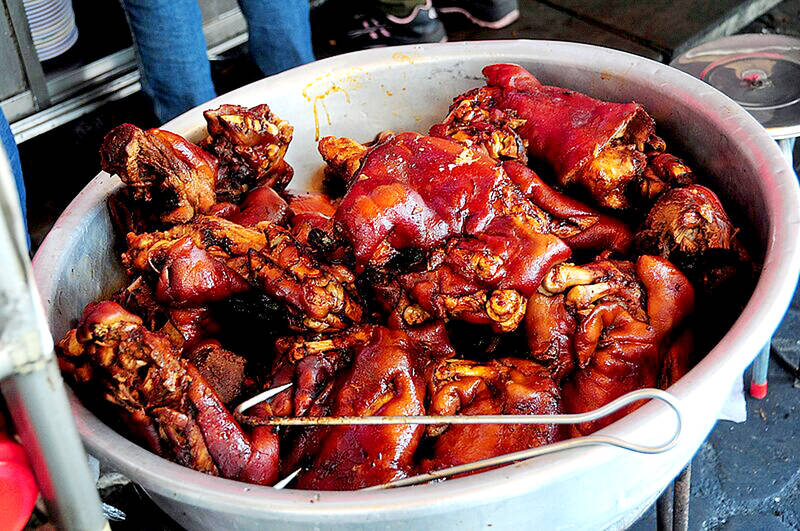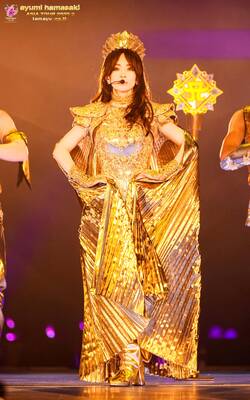Roasted German trotter is a popular dish known for its crispy outer layer. In contrast, Taiwanese prefer to braise trotters, especially front trotters, as they are used more by a pig to walk and thus are leaner and have more tendons. This results in a gelatinous texture with a less greasy taste. After removing hair, quick-boiling, and cooling, they are marinated in a mixture of soy sauce, crystal sugar, and a spice pouch of Chinese herbs for a long period to achieve a bright amber appearance. The dish can be enjoyed hot or cold, and it is usually served with a dipping sauce that varies from restaurant to restaurant.
德國豬腳外皮酥脆聞名,然而台灣人更偏好用滷的,特別選用豬前蹄來滷,豬平時走路多用前腳,肉瘦多筋,富有膠質,吃起來不油膩。將豬腳去毛、汆燙、冷卻後,再以醬油、冰糖和中藥滷包長時間燉滷,滷好的豬腳呈琥珀色,既可以熱食也可以冷食,沾著各家獨門調製的沾醬享用。
lean (adj.)(肉)脂肪少的,精瘦的

Photo: Flickr l 圖片:Flickr
tendon (n.) 肌腱,筋
remove (v.) 去除
marinate (v.) 醃
Chinese herb (n. phr.) 中藥
amber (n.) 琥珀; (adj.) 琥珀色的
dipping sauce (n.) 沾醬
Braised trotter is a popular dish in Taiwanese cuisine, and Wanluan’s version is particularly well-known. Originally an agricultural community, Wanluan was home to many Hakka villagers. The farms there mainly produce betel nuts. In 1981, then president Chiang Ching-kuo visited Wanluan Township and tasted braised trotters at the Haihong Restaurant, helping to spread the dish’s reputation throughout the island. The popularity inspired other villagers to start their businesses selling braised trotters, leading to the establishment of Wanluan Pig Trotter Street in 2004 by the Pingtung County Government. The street has attracted many visitors to enjoy this local signature dish.
台灣以萬巒豬腳最為有名,萬巒鄉民早年務農,大多為客家人,主要種植檳榔。1981年,先總統蔣經國先生下鄉視察,途經萬巒的海鴻飯店品嘗豬腳,讓萬巒豬腳的名聲大燥。屏東縣政府於2004年順勢推出萬巒豬腳街,吸引許多遊客前來大啖豬腳。
betel nut (n.) 檳榔
signature dish (n phr.) 招牌菜
Taiwanese people eat trotters not only because they are delicious, but because they are customarily eaten to get rid of back luck. Braised trotters misua are consumed after overcoming a challenging time, such as recovering from illness or being released from jail. This is reflected in the Taiwanese Hokkien proverb: “It’s the most unfortunate who step in pig manure.” Pigs living in a pigsty always step in their manure, so they are considered the most unfortunate creatures. Eating the trotters symbolizes that people have already overcome difficult times in life, hoping that only good luck will continue to come their way.
吃豬腳可不僅是為了享口福,也有吃豬腳去霉運的習俗。台灣人在經歷過康復和出獄等重大關卡後,會吃豬腳麵線。有句台語諺語這麼說:「衰到踏到豬屎。」豬養在豬圈中,每天都在踩豬屎,十分倒楣。吃豬腳象徵著已經跨過了人生最壞的境地,之後將否極泰來,好運連連。
manure (n.) 糞便,糞肥
pigsty (n.) 豬舍
Taiwanese people, besides having a birthday cake, will also serve braised trotters misua to celebrate at an elder’s birthday banquet. People in ancient times believed that the longer one’s face is, the longer one can live. “Face” sounds like the word for “noodles” in Chinese, so long thin noodles are also called “longevity noodles.” Therefore, braised trotters misua can also be enjoyed as wishes for good luck and longevity.
除此之外,台灣人會在長輩生日時,除了吃蛋糕、吹蠟燭,也會吃豬腳麵線,祝福長輩事事順心、長命百歲。因為古人認為臉越長,壽命就越長,而「面」與「麵」同音,所以又細又長的麵線又稱為「長壽麵」,自古以來視為長壽的象徵。因此,吃豬腳麵線也祝福長輩事事順心、長命百歲的含意。
banquet (n.) 宴會
longevity (n.) 長壽
文章由書林出版公司提供:
www.bookman.com.tw

A: Apart from the musical Sunset Boulevard, Japanese pop diva Ayumi Hamasaki is also touring Taiwan after a 17-year wait. She’s holding two concerts starting tonight. B: Ayu has the most No. 1 hits of any Japanese solo artist, with 33 total. A: “Time” magazine even crowned her as “The Empress of Pop.” B: She staged shows in Taipei back in 2007 and 2008, causing an “Ayu fever” across Taiwan. A: Unfortunately, the singer has been deaf in her left ear since 2008, and is gradually losing hearing in her right ear. I’m so excited to see her singing in Taipei again. A: 除了音樂劇《日落大道》,日本歌后濱崎步睽違17年,今晚起在台北熱唱兩場。

Denmark’s state-run postal service, PostNord, announced that it would cease letter deliveries at the end of 2025 due to the impact of digitalization. As 95% of its residents now use the Digital Post service, Denmark has seen a 90% decline in letter volumes since 2000, from 1.4 billion to 110 million last year. On top of that, the Postal Act of 2024 removes the government’s obligation to provide universal mail service and puts an end to postal exemptions from value-added tax, raising the cost of a single letter to 29 Danish krone (US$4.20). As a result, PostNord is switching

A: After touring Taipei, the play Life of Pi is now heading to Taichung. You wanna go? B: Did you forget? We’re going to Taipei this weekend to see the musical Sunset Boulevard and go to Japanese pop diva Ayumi Hamasaki’s concert. A: Oh yeah, that’s right. The classic composed by Andrew Lloyd Webber is touring Taiwan for the first time. B: I heard that it’s adapted from a 1950 film with the same title. A: And the show will feature legendary soprano Sarah Brightman, who is finally returning to the musical stage after 30 years. We can’t miss it. A: 在台北巡演後,戲劇《少年Pi的奇幻漂流》本週起將移師台中。要去嗎?

Although sending you an SMS (Short Message Service) verification code provides some security, many apps now use code-generating apps and two-factor authentication instead. But more recently, passkeys now use a biometric approach to logging in. Biometrics can offer an even more secure alternative. Following this trend, Google is reportedly planning to replace SMS verification codes with “QR code” scanning. SMS codes are currently used to verify user identity and prevent fraudsters from creating fake Gmail accounts to distribute spam. However, these codes present several challenges. They can be phished through suspicious links, and users may not always have access